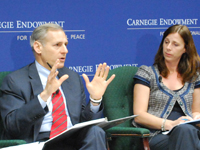Registration
You will receive an email confirming your registration.
Established in 2004 by the Bush administration to bolster U.S. development aid, the Millennium Challenge Corporation (MCC) gives significant development assistance to countries that pursue good governance, invest in health and education, and adopt sound economic policies. With a new US administration in place, basic questions about the MCC's future are open for debate and decision.
At an event hosted by Carnegie on April 8, John Hewko, nonresident senior associate at Carnegie and former vice president of the MCC, presented the findings of his new report, “Millennium Challenge Corporation: Can the Experiment Survive?” Current MCC vice president Sheila Herrling and acting vice president Darius Teter responded to his presentation. Carnegie vice president for studies Thomas Carothers moderated.
The MCC: Key Challenges
According to Hewko, at the creation of the MCC, the White House, Congress, the development community, and potential recipient countries all had differing and often unrealistic expectations of the new institution. With time the MCC’s role has become clearer, but tempering divergent expectations and retaining operational independence remain important priorities for the MCC.
The very criteria that govern the MCC, from the indicators that are used to determine eligibility to the significance placed on maintaining transparency, can sometimes cause problems. Herrling, Hewko, and Teter offered examples of some of the challenges the MCC has faced:
- Good governance indicators: Aid eligibility is determined by a range of criteria, including a country’s basic goveernance practices. If a country qualifies for an aid compact but then subsequently slips below the required level on key governance indicators that determine eligibility, this can create a difficult situation for the MCC, Herrling explained. Determining the appropriate policy response to such a situation can be challenging, particularly when some aid has already been distributed. Moreover, the data used to determine a country’s eligibility can be unreliable, which creates further problems.
- Transparency: Teter argued that although a significant effort toward transparency is one of the MCC’s strengths, it also leaves the organization at risk of strong criticism if a project fails. As a result, the MCC must always be sure to carefully design aid projects, in order to maximize returns.
- Democracy: Herrling noted that the MCC is sometimes criticized for occasionally providing assistance to non-democracies. However, because three of the eligibility indicators are democracy related, it is a rare occurrence, with the vast majority of assistance going towards governments that have achieved at least a basic level of democracy.
- Independence: Hewko argued that if the MCC became part of the State Department or USAID, the loss of political independence would seriously threaten its ability to succeed in its mission.
Suggestions for Improvement
Hewko argued that the MCC must remain committed to certain governing principles if it wants to be successful in the long-term. These principles include:
- Maintaining a focus on long-term investment to reduce poverty.
- Avoiding the use of aid as a short-term foreign policy tool.
- Tempering expectations from all parties.
- Remaining firm concerning country selection eligibility.
- Maintaining patience with the pace of project signing and completion.
- Staying flexible in project design.
Hewko also encouraged the MCC to employ more innovative and nontraditional development models, which have greater potential for reward. He suggested that the MCC should seek closer engagement with the private sector and provide better training for its country partners. He also argued for the elimination of the MCC’s threshold program, which is responsible for helping countries become eligible for MCC aid contracts.
According to Teter, the MCC needs to work on communicating its important efforts to reform in-country institutions. “We are not just building roads,” Teter stated. “We’re helping to reform road policies.” Herrling concurred, contending that the MCC has had an important impact in many countries and needs to publicize its successes.
